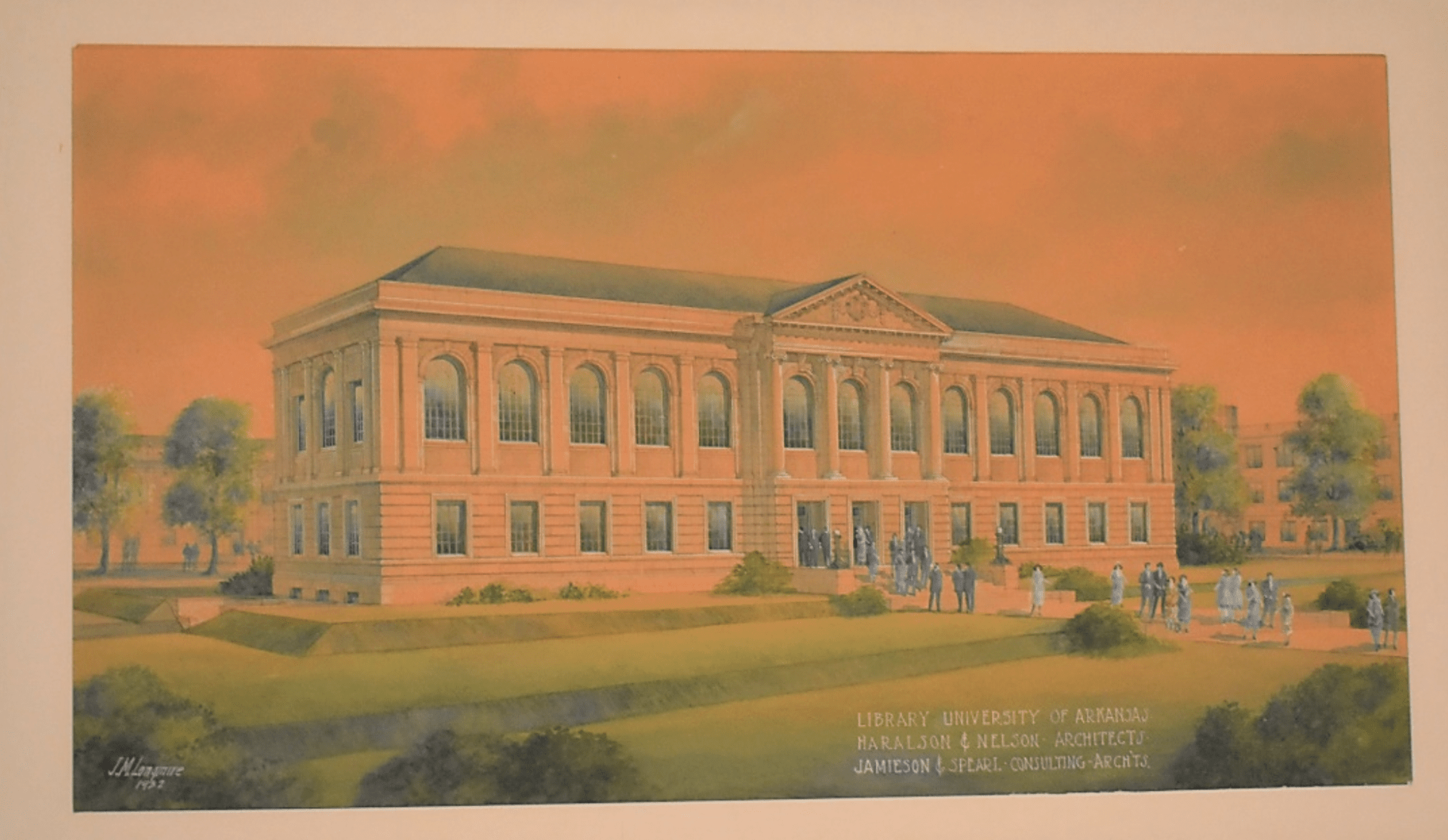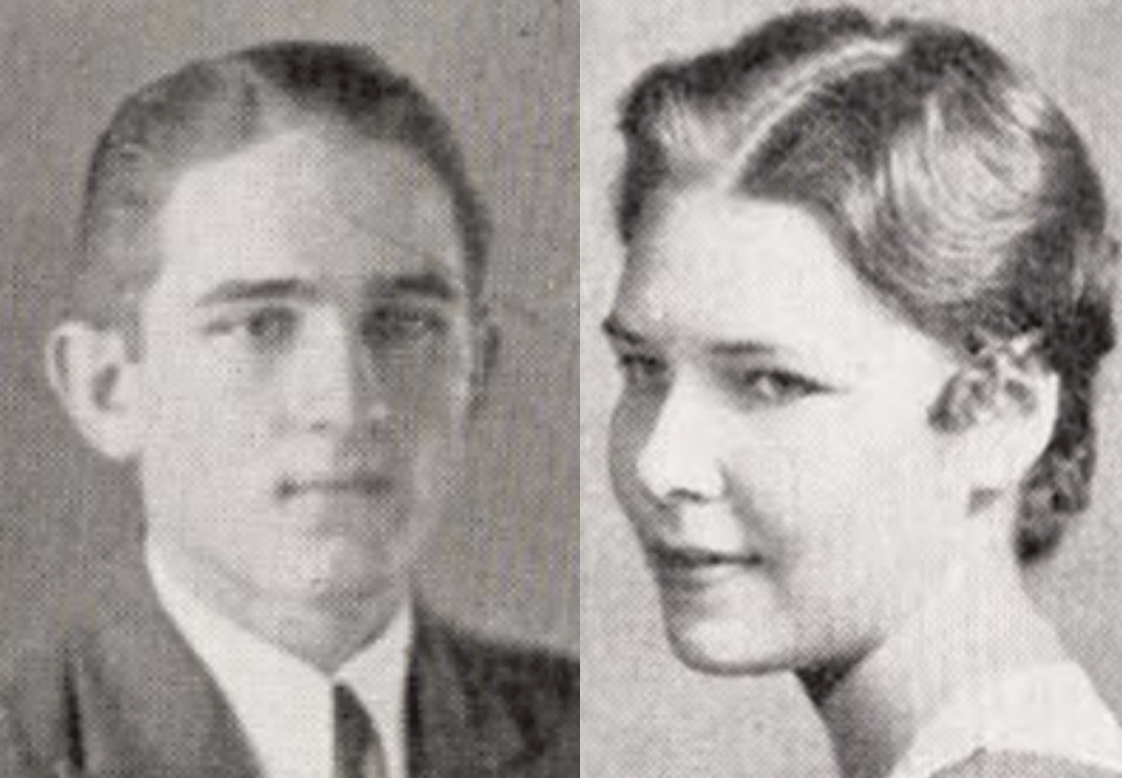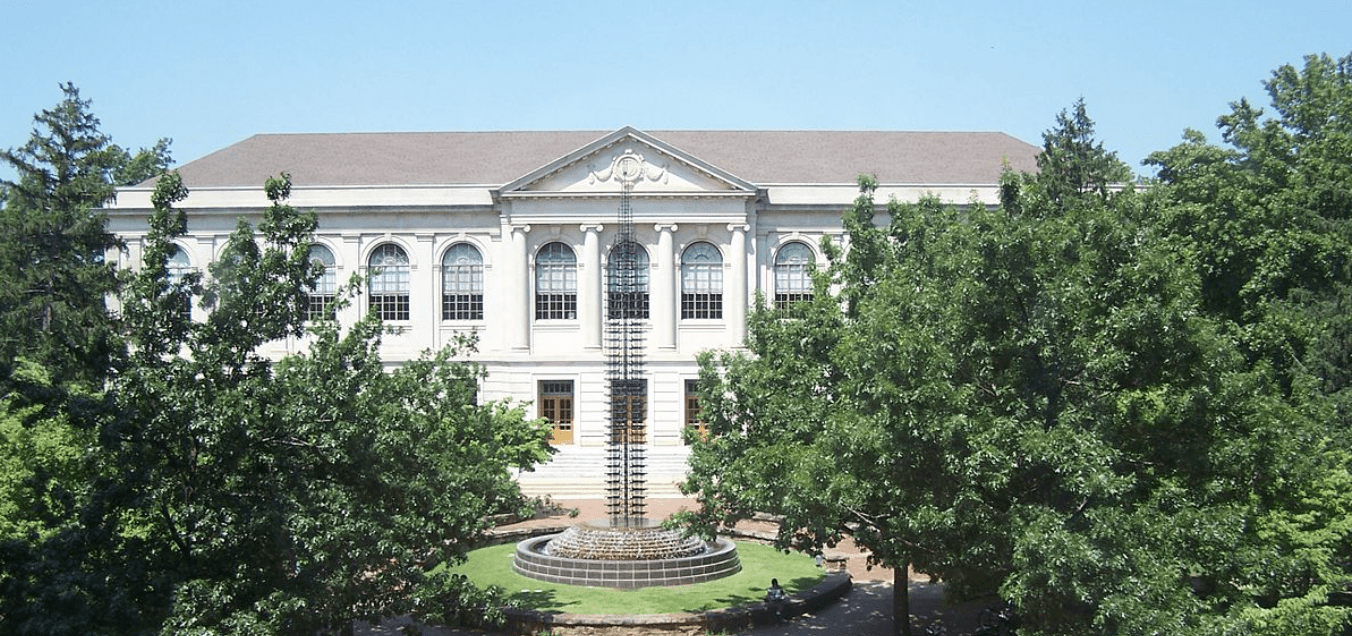
Original architectural drawing of Vol Walker Hall as it was designed to be the campus library in 1932, built in 1935. The architeccts are Haralson and Nelson, from Forth Smith, consulting architects are Jamieson and Spearl. J.M. Longmire constructed the drawing. Photo Courtesy of The University of Arkansas Museum.
Author Bio: Jazlyn Sanderson is a current honors senior, completing her B.A. in December 2020 with a major in Art History and a minor in history. Her study interests lie in pre-Columbian art and craftwork. Currently, she is working as an intern with the Museum of Native American History in Bentonville, AR.
College has always been an expensive endeavor. However, there have only been a few times in history where the nation has faced economic collapse, causing individual financial struggles to heighten. The Great Depression is one such historic time. In 1930, Herman Harrison Hankins, a University of Arkansas student, was just one of many who went through strenuous economic struggles due to the Great Depression to gain a degree. His father sold two milk cows to give Herman the $50 to help pay the $65 tuition. Herman was the first of nine children, on a cotton farm in Pine Bluff, to express the aspiration for higher education. While in college, he worked multiple jobs, lived in a barn loft and a basement, but described his time at the U of A as the best four years of his life. Herman was a member of Alpha Gamma Rho, Four H Club, treasurer of Alpha Zeta, and on The Arkansas Agriculturalist staff, becoming the business manager in 1933. He even met his wife, Frances Greer, while at the University. She also faced similar strenuous economic troubles due to the Depression. Frances was from Fayetteville, and she studied home economics and was a member of Phi Alpha Beta, Home Economics Club, A.D.A. as the assistant manager, and an assistant on The Arkansas Agriculturalist. Herman and Frances stressed the importance of education to their four children; to them, it was difficult but changed their life for the better. Herman became the state director of the Farmers Home Administration (which has since become the Farm Service Agency) in the United States Department of Agriculture.

Herman Harrison (left) and Frances Greer (right) during their time at the University of Arkansas. Photos courtesy of the Razorback Yearbook Digital Collections.
Many students during this period were just like Frances and Herman, finding themselves in an economic struggle due to the Depression but incredibly driven to graduate. Students’ lives were disrupted financially, which led to problems and new challenges in their lives. However, these struggles gave them a new perspective, drive, and optimism for the rest of their lives.
The Great Depression ultimately disrupted people globally from 1929 to the late 1930s. Relief came to Arkansas in 1935 with the Works Progress Administration (W.P.A.) The administration offered needed social services and improved infrastructure while providing 8.5 million people with jobs nationwide. Social programs such as The Federal Writers Project gave historians, writers, and other academics a platform to convey contemporary and historical information, such as an oral history project generally known as the Slave Narratives. The project focused on interviewing former slaves in the southern United States. Arkansas made up one-third of the project by the time of its end in 1939. From the W.P.A., relief came to the people immediately, but their projects hold a significant role in history and historic preservation.
There are W.P.A. led projects that still influence our lives presently. Across the University’s campus, a total of seven buildings were constructed during the Great Depression relief efforts. One of these important buildings is the current Vol Walker Hall (1935), which was initially designed to be the campus library with the basement acting as the University museum. Since then, Vol Walker Hall has been the site of essential gatherings such as equal housing rights demonstrations, the 1968 Dr. Martin Luther King Jr. memorial march, and Vietnam War protests. Other notable buildings include Memorial Hall (1940), Gibson Hall (1937), and Razorback Stadium (1938).
Upon reflection of these events, it seems natural to categorize the Great Depression as a terrible time in world history. However, looking at the products coming out of that time, it seems hard to think about living without these milestones. Should Vol Walker Hall never have the relief funds, how would our campus history change? If the Great Depression never happened, would we still have the testimonies in the Slave Narratives? The students, like Frances and Herman, that came out of the Great Depression found themselves humbled by their reality. The Great Depression was a horrendous tragedy that caused mass disruptions across society. However, we cannot ignore the positive and long-lasting effects of history. When we look back on our current situation today, perhaps we, too, can categorize some positive and long-lasting effects amidst the tragedy and disruption. 2020 has undoubtedly upheaved our political and social scene; we can only expect change to come in the coming days, months, and years.
Sources:
Meaghan Blanchard, “Educational Legacy Extends to Next Generation of Students” Fulbright Review, October 9, 2018, https://wayback.archive-it.org/6471/20191203014038/https://fulbrightreview.uark.edu/graduates-educational-legacy-extends-to-next-generation-of-students/.
Razorback. Fayetteville, Arkansas: Published by the students of the University of Arkansas, 1934. Published annually. Also available at https://archive.org/details/Razorback_YB1934/page/n255/mode/2up?q=Hankins.
Razorback. Fayetteville, Arkansas: Published by the students of the University of Arkansas, 1935. Published annually. Also available at https://archive.org/details/Razorback_YB1935/page/n89/mode/2up?q=greer.
Sam Morgan, “Works Progress Administration (WPA),” Encyclopedia of Arkansas, July 16, 2020, https://encyclopediaofarkansas.net/entries/works-progress-administration-2284/.
Please note, these records should not solely speak for the universal experience of slavery. Many accounts are heavily biased due to the interviewer’s perspective. John Spurgeon, “WPA Slave Narratives,” Encyclopedia of Arkansas, July 23, 2015, https://encyclopediaofarkansas.net/entries/wpa-slave-narratives-4041/.
“University of Arkansas: Vol Walker Hall (Library) – Fayetteville AR,” The Living New Deal, https://livingnewdeal.org/projects/university-of-arkansas-vol-walker-hall-library-fayetteville-ar/.
“University of Arkansas – Fayetteville AR,” The Living New Deal, https://livingnewdeal.org/projects/university-of-arkansas-fayetteville-ar/.

